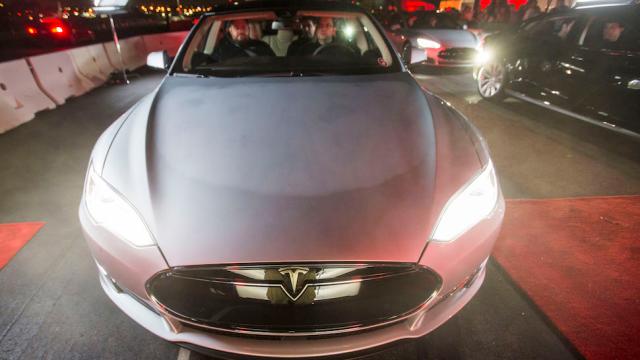According to 126 Tesla customers, the Model S sedan P85D performance version can eat dirt, because its “insane mode” isn’t as insane as the company claims.
Bloomberg reports that the customers, who live in Norway, have now filed a lawsuit against Elon Musk’s automotive company. They’re looking for “unspecified reimbursements” because they believe the car’s “insane mode” isn’t exactly as advertised.
“[It] has too low horsepower,” Kaspar N. Thommessen, a lawyer for the customers, told Bloomberg. “And of course, it affects the car’s performance, according to the consumers.” One customer told the Norwegian newspaper Dagens Næringsliv that the car’s advertised horsepower — 700 — and its acceleration claims — 0 to 60 mph in roughly 3.3 seconds — were total bullshit. (In 2015, Consumer Reports noted that it took 3.5 seconds.)
Tesla, for its part, said that tests from both the company and outside groups show the stated specifications are indeed accurate. “[The tests have] demonstrated that the Model S P85D’s acceleration and motor-power numbers have always been accurate … [and] confirmed as accurate by European regulatory authorities,” a Tesla spokesman told Bloomberg.
In June, Norway’s Consumer Council ruled against Tesla in a similar case, awarding Model S P85D buyers about $US6,000 ($7,948) each over claims the car didn’t meet its power specifications. But as the website Electrek explained at the time, that dispute may have been more a symptom of deceptive advertising rather than outright lying:
The issue revolved around the way Tesla was listing the power of its motors for the Model S P85D, which has two motors. When first introducing the vehicle, Tesla was marketing the vehicle as having a combined motor output of 691 hp (467 in the back and 224 in the front).
While those are indeed the correct outputs of each motor, the vehicle was never able to achieve those numbers due to several other limitations than only the combined potential output of the motors.
Tesla claimed that they always made it clear that the numbers were for the motors and not the vehicle itself. The automaker also highlighted that it didn’t actually change the actual performance ratings of the Model S P85D, but some owners still felt deceived.
Either way, for upwards of $US100,000 ($132,469), it’s not surprising at least a few customers are quibbling over the car’s performance. According to Bloomberg, the Oslo District Court will hear the case in mid-December.
The most recent dustup is yet another in Tesla’s long line of new headaches. Yesterday, then there was the lawsuit Tesla filed last week against an oil executive, claiming he impersonated Elon Musk using a dumb Yahoo email address.
Hey, Elon, you doing ok, buddy? Do you need a facial or something? Maybe some wine?
